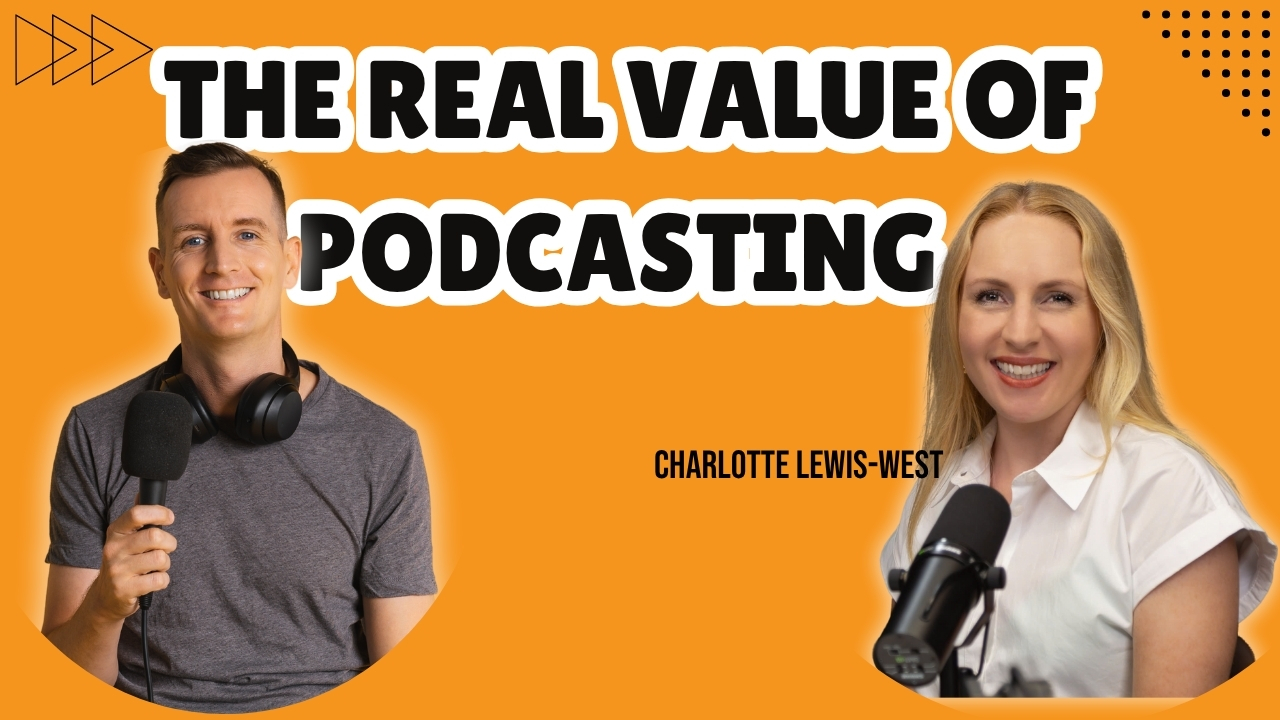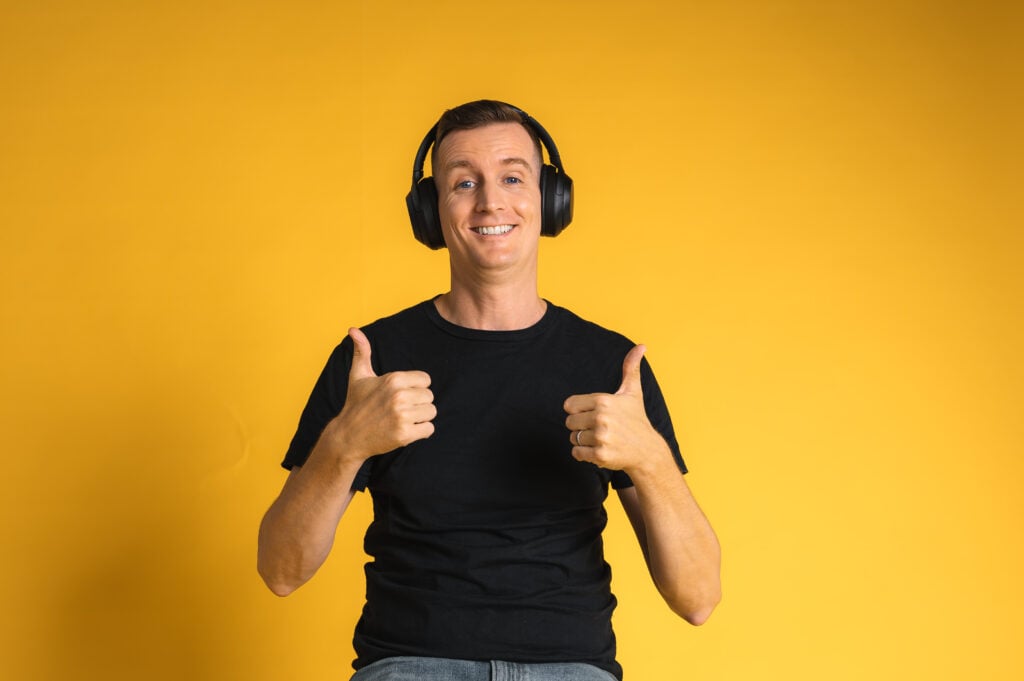Podcasting continues to grow as a powerful medium, with billions being poured into advertising each year. But if you’re an indie creator or a business thinking of starting a podcast, you might be wondering: Where is that money going — and how can I tap into it?
My name is Niall Mackay, The Podcast Guy. I’m an indie podcaster as well as podcast producer and I have wondered the same question, too. So I invited Charlotte Lewis-West to unpack the realities of podcast monetization and the deeper value podcasts can bring to individuals, businesses, and content creators.
We explored where the ad money really flows, the most common mistakes both brands and indie creators make, and how to build a podcast that supports your business, even if it doesn’t bring in direct sponsorship right away.
What is Podcast Monetization Truly?
I tackled one of the most common and misleading narratives in the podcasting world: that podcasting is an easy way to make money.
Where is podcast money?
Billions of dollars are pouring into the industry globally. And while the numbers are real, they don’t tell the whole story, especially not for indie podcasters.
Charlotte confirmed what many of us in the industry already suspect. Yes, the podcast advertising market is growing rapidly, particularly in places like the US, UK and Australia.
But the reality is that most of that ad spend is concentrated at the top — among massive media networks, celebrity-led shows, and podcasts that are already part of larger entertainment ecosystems.
These are networks that often
- Run dozens of shows
- Have cross-platform exposure (TV, radio, streaming)
- Have entire sales teams dedicated to attracting advertisers.
This kind of scale is far removed from what most independent podcasters experience.

The True Expectation
I used Diary of a CEO as an example — a show I find dull, but undeniably successful due to heavy investment in production and marketing. Like Coca-Cola, it’s not great simply because it’s the most popular — it’s because money and marketing makes it visible.
That’s the point I wanted to make: indie podcasters shouldn’t beat themselves up. Many expect quick success and quit when sponsors don’t show up. Around 90% of podcasts don’t make it past 10 episodes, often because creators start with unrealistic expectations.
My Case Study
Case in point: A Vietnam Podcast just surpassed 100,000 downloads — placing it in the top 5–10% globally. And yet, not one sponsor has ever approached me. Every sponsorship I’ve had came from my own outreach. That takes time, energy, and persistence, which is why many hobbyists don’t pursue it.
The Real Value of Podcasting (Beyond Money)
In our conversation, Charlotte and I shifted the focus from monetization to something just as important — the broader value a podcast can bring to you or your business.
If your only goal is to make money fast, podcasting probably isn’t the right fit. But if you’re looking to grow your brand, build trust, and open new opportunities, the return can be far greater than just ad revenue.
Brand Awareness
Charlotte pointed out that podcasting is a powerful tool for brand awareness. Whether you’re building a personal brand or growing a business, podcasting elevates your visibility and creates a much deeper connection with your audience than traditional advertising ever could. You’re literally in someone’s ears for 20 minutes to an hour — that level of engagement is rare.
Build Trust
Through consistent content, you build the “know, like, and trust” factor that leads to real business results — not instantly, but over time. Podcasting is a long game. You might only have 50 listeners at first, but those 50 can become loyal clients, advocates, or collaborators if you keep showing up and offering value.
Networking
We also talked about one of the most underrated benefits: networking. Inviting guests onto your podcast gives you direct access to people you’d never get a meeting with otherwise. It’s a chance to build relationships, start conversations, and open doors — without ever asking to “pick someone’s brain” over coffee.

Common Mistakes Podcasters Make — And How to Avoid Them
Charlotte and I discussed some of the most common mistakes brands and indie creators make when launching a podcast — and how to avoid falling into the same traps.
Big Brands’ Mistakes
- Assuming Content Preferences
For big brands, one of the most frequent missteps is assuming that audiences want to hear their messaging front and center. Too often, companies focus on telling their brand story, rather than crafting content that actually connects with listeners. As Charlotte pointed out, the most effective branded podcasts lead with storytelling, authenticity, and value, not sales pitches.
- Broad Audience Targeting
Another major mistake is not defining the target audience. When asked, many businesses say they’re trying to reach “everyone.” But podcasting is a niche medium, and success comes from knowing exactly who you’re speaking to. Understanding your ideal listener informs every decision — from content and tone to promotion and distribution.
- Lack of Promotion
Brands also underestimate the importance of promotion. Creating a podcast is just the beginning — if you don’t invest in marketing, no one will hear it. Charlotte recommends matching your production budget with a promotion budget to ensure your content actually reaches the right people.
Indie Podcasters
We also flipped the perspective to indie podcasters, who, interestingly, tend to make fewer mistakes, often because they’ve done more homework. But common challenges still arise.
- Doing Everything at Once
Many independent creators try to do too much at once: video, ads, social media, and scattered topics, without a clear strategy. The advice here is to start small and stay focused. Podcasts grow over time, and listeners are generally forgiving if the content is evolving.
- Forgetting Objective and Audience
Another pitfall is losing sight of your original audience. As podcasts gain traction, some creators shift their focus to chase trends or broader appeal, forgetting the loyal listeners who supported them early on. Staying true to your original mission and checking in with your audience regularly is essential for long-term success.
- Monetization Expectation
Expecting quick monetization (e.g., after two seasons) and becoming disheartened when it doesn’t happen. While advertising and sponsorship are options, they are difficult to secure for smaller podcasts, and passion and connection should be the primary drivers.
Making Podcasting Worth It — Even Without Big Sponsors
One of the questions Charlotte often hears from her masterclass students is: “How do I monetize my podcast?” Many have already put in the work, sometimes over multiple seasons, and feel they need to start seeing financial returns to justify continuing.
The reality is, traditional monetization through ads and sponsorship is possible, but it’s not easy, and certainly not reliable for most indie creators. As we’ve discussed, the money in podcasting tends to flow toward big networks and well-funded productions. If you’re podcasting just for sponsorship, you’re likely setting yourself up for disappointment.
But there are still valuable and sustainable ways to make podcasting work financially:
- Drive listeners to your business – A podcast can be an effective funnel to sell your services or products.
- Offer niche expertise – Even with a small audience, you can attract clients if your content speaks to their needs.
- Secure local sponsorships – These often come from outreach, not waiting for brands to knock on your door.
- Create a branded podcast – Partner with a business or venue to produce a show that aligns with their goals, while still keeping your voice.
If you do land a sponsor, remember: your voice and your trust with your audience are your biggest assets. Be confident, be personal, and stay true to your style. That’s what makes podcasting work.
Conclusion
While podcasting can be a powerful tool for generating revenue, it rarely happens overnight, especially for indie creators. The real return on investment often comes in less obvious but more impactful ways: building trust, growing your brand, deepening audience connection, and opening doors to new opportunities.
If you’re creating meaningful content, targeting the right audience, and staying consistent, monetization, in various forms, can and will come. But it’s essential to focus first on delivering value, not chasing quick wins.


